Is Your Dog Scared of Thunder and Fireworks? Understanding and Managing Noise Aversion
Thunderstorms. Fireworks. Construction. For many of us, these are passing sounds in the background. But for our dogs, these noises can be terrifying. At Cobb & Co. Veterinary Clinic, we understand how heartbreaking it can be to see your dog trembling, pacing, or trying to hide at the first clap of thunder or pop of fireworks. If your dog reacts strongly to loud sounds, you’re not alone—and there are compassionate, effective ways to help.
Let’s explore what noise aversion really means, why it matters, and how to give your dog the calm they deserve.
What Is Noise Aversion in Dogs?
Noise aversion is more than a simple fear—it’s a phobia that triggers a fight-or-flight response. While a loud bang may just be startling to us, a dog with noise aversion may experience it as an immediate and overwhelming threat. This can lead to behaviors that range from mild stress signals to severe panic attacks.
Common triggers include:
- Thunderstorms
- Fireworks
- Sirens or alarms
- Construction noise
- Loud household appliances (vacuums, blenders)
Some dogs may only react to one type of sound, while others develop a broader sensitivity over time.
What Causes Noise Aversion in Dogs?
Noise aversion can stem from a variety of factors, often unique to each dog:
- Genetics: Certain breeds are more prone to anxiety and sound sensitivity.
- Lack of Early Exposure: Puppies not introduced to varied sounds during critical development periods are at greater risk.
- Past Trauma: Dogs who’ve had negative experiences during noisy events may associate all similar sounds with danger.
- Medical Issues: Pain or cognitive decline in older dogs can increase sound sensitivity, making even everyday noises distressing.
Understanding the root cause helps tailor a treatment plan that addresses both behavior and any underlying medical concerns.
Why Noise Aversion Deserves Attention
A dog living with unmanaged noise anxiety isn’t just uncomfortable—it’s suffering. Over time, repeated exposure to triggering sounds can lead to:
- Chronic stress and heightened general anxiety
- Escape behaviors (like jumping fences or breaking through doors)
- Destructive behavior or house soiling
- Fear generalization, where even unrelated sounds cause panic
Moreover, it can take an emotional toll on you as the owner, feeling helpless or worried about when the next storm or fireworks display might happen.
How to Recognize the Signs of Noise Aversion
Symptoms can vary by dog and severity. Look for:
Mild Signs:
- Panting
- Lip licking
- Pacing or restlessness
- Seeking comfort from humans
Moderate to Severe Signs:
- Trembling
- Hiding under furniture
- Barking or whining
- Urination or defecation indoors
- Attempts to escape through windows or doors
- Destructive behavior (chewing, digging, scratching)
Dogs may also show signs even before the noise starts if they associate certain cues (like dark clouds or fireworks smells) with previous traumatic experiences.
Diagnosis: What to Expect at Cobb & Co. Veterinary Clinic
When you bring your dog in, we’ll take a compassionate, comprehensive approach:
- Medical history review: We’ll explore past reactions, any known triggers, and changes in behavior.
- Physical exam: It’s important to rule out pain, hearing loss, or neurological issues.
- Behavioral assessment: We may ask you to describe or record your dog’s behavior during episodes.
We encourage you to visit our behavioral counseling page to learn more about our diagnostic approach and support options.
Treatment: A Multi-Faceted Approach to Calm
Helping your dog cope with noise aversion typically involves a combination of approaches. No single solution works for every dog, but together we’ll build a plan that’s right for yours.
Environmental Management
- Set up a quiet, safe space (a covered crate, walk-in closet, or basement room)
- Use white noise machines, calming music, or fans to mask loud sounds
- Close blinds or curtains to block visual stimuli like lightning or fireworks
Behavioral Modification
- Desensitization and Counterconditioning: Gradual exposure to recorded sounds paired with positive experiences (treats, play) helps retrain your dog’s response
- Working with a certified professional trainer can enhance results. Visit AVSAB to learn more about qualified professionals.
Medications and Supplements
- Anti-anxiety medications may be prescribed for severe cases or during high-risk events like July 4th or New Year’s Eve
- Calming supplements or pheromone diffusers may provide additional support
- Medication is often most effective when combined with behavior therapy
Preventative Training
- For puppies, early and positive exposure to new sounds is critical
- Use controlled sound recordings and rewards to create positive associations
- Avoid reinforcing fear behaviors (e.g., don’t punish or coddle—stay calm and consistent)
Daily Life with a Noise-Averse Dog
Managing daily life involves preparation and flexibility:
- Check local fireworks or storm forecasts
- Avoid outdoor walks during expected loud events
- Offer puzzle toys, scent games, and enrichment activities to reduce general stress
- Use calming gear like anxiety wraps or snug-fitting shirts
Explore dog enrichment ideas for creative ways to engage and soothe your pet.
The Role of Research and Emerging Solutions
Veterinary behaviorists are continuously researching new tools and techniques to address canine anxiety:
- Noise sensitivity genes are being studied to help predict risk
- New medications with fewer side effects are emerging
- Technology like pet wearables or anxiety-tracking apps can help monitor stress responses in real time
Stay in touch with your veterinarian about updates in treatment options that may benefit your dog.
When to Seek Veterinary Help
Don’t wait until symptoms become unmanageable. If your dog shows escalating signs of anxiety, or if they are at risk of self-injury or escape, it’s time to get professional help.
Prepare for Your Appointment:
Bring:
- A written log of symptoms, duration, and frequency
- Videos of your dog’s behavior during noisy events
- A list of current medications and supplements
- Your questions: “What long-term strategies work best?” “Are medications needed now or just situationally?”
FAQs: Common Questions About Noise Aversion
Can noise aversion be cured?
Complete cures are rare, but many dogs can achieve significant improvement with the right strategies.
Does my dog need medication long-term?
Not always. Some dogs benefit from short-term support during predictable events, while others need more regular treatment.
Can puppies develop noise aversion later?
Yes, especially if they experience trauma or aren’t properly socialized early on.
Is it okay to comfort my dog when they’re scared?
Yes—but stay calm. Avoid frantic petting or overly sympathetic behavior, which may reinforce panic.
We’re Here to Help
At Cobb & Co. Veterinary Clinic, we’re more than just your vet—we’re your partner in creating a safe, healthy, and happy life for your dog. If noise aversion is affecting your pet’s quality of life, we encourage you to schedule an appointment or contact us today. Together, we can help your dog feel safe, secure, and supported—no matter what the skies (or neighborhood celebrations) bring.


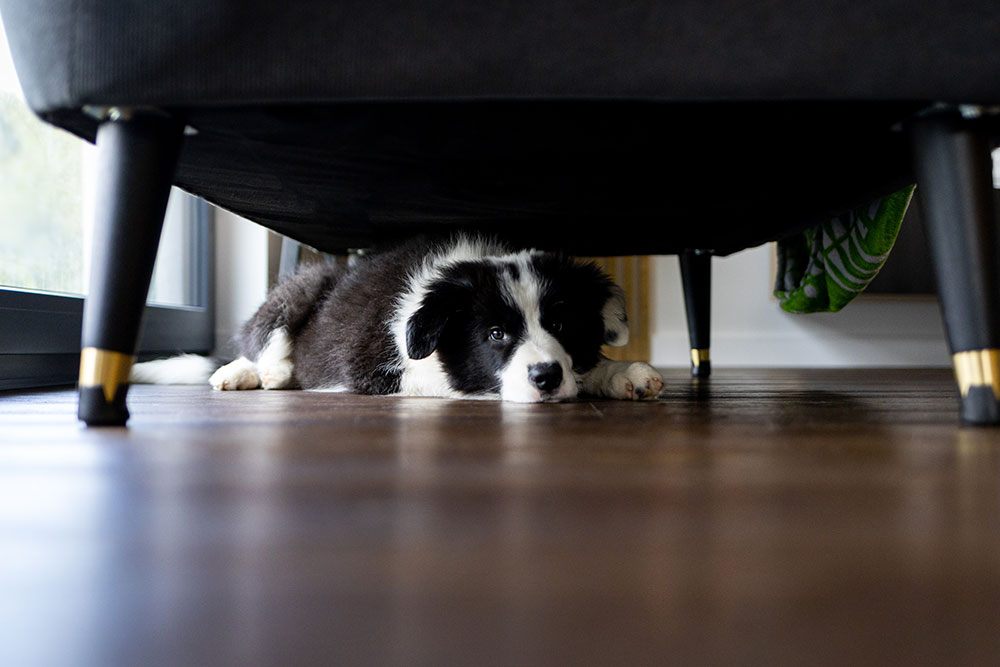
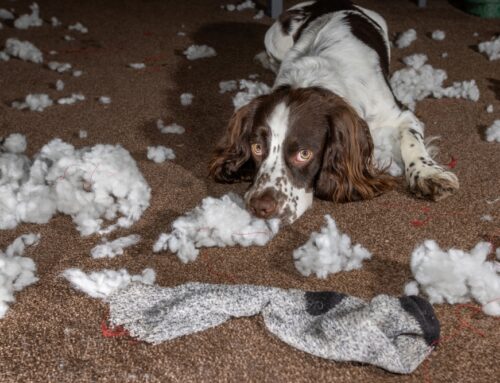
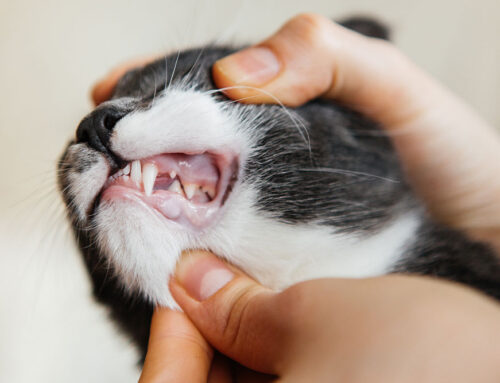
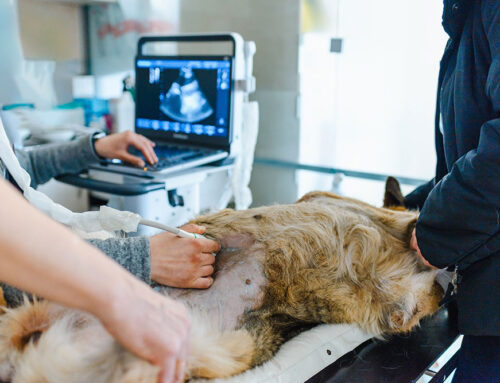
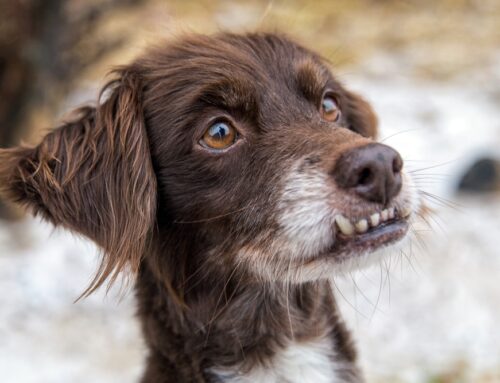
Leave A Comment